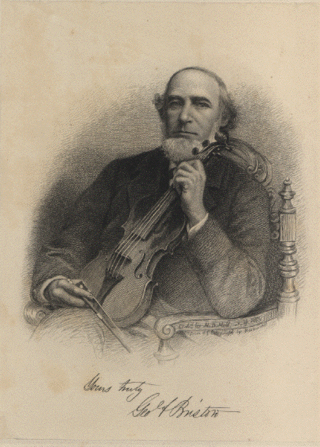Related Research Articles

Dame Janet Abbott Baker is an English mezzo-soprano best known as an opera, concert, and lieder singer.
Sea Pictures, Op. 37 is a song cycle by Sir Edward Elgar consisting of five songs written by various poets. It was set for contralto and orchestra, though a distinct version for piano was often performed by Elgar. Many mezzo-sopranos have sung the piece.
The Music Makers, Op. 69, is a work for contralto or mezzo-soprano, chorus and orchestra composed by Edward Elgar. It was dedicated to "my friend Nicholas Kilburn". It was first performed at the Birmingham Festival on 1 October 1912, conducted by the composer, with Muriel Foster as the soloist.

Robin Humphrey Milford was an English composer and music teacher.

George Frederick Bristow was an American composer. He advocated American classical music rather than European pieces. He was involved in a related controversy involving William Henry Fry and the New York Philharmonic Society.
The Leeds Festival Chorus is based in Leeds, West Yorkshire, England. It has 160 singing members in soprano, alto, tenor and bass sections. Presenting classical choral music of a professional standard in Yorkshire and elsewhere, including at the BBC Proms and abroad - for example in Venice. The Chorus is broadcast regularly on BBC Radio 3.
Antonín Dvořák's Requiem in B♭ minor, Op. 89, B. 165, is a funeral Mass scored for soloists, choir and orchestra. It was composed in 1890 and performed for the first time on 9 October 1891, in Birmingham, England, with the composer conducting.
Leeds Philharmonic Chorus is a leading choir in Europe, regularly performing to professional standards with internationally renowned soloists, orchestras and conductors.
The English conductor Sir Adrian Boult was a prolific recording artist. Unlike many musicians, he felt at home in the recording studio and actually preferred working without an audience. His recording career ran from November 1920, when working with Diaghilev's Ballets Russes he recorded the ballet music, The Good-Humoured Ladies, to December 1978, when he made his final recording of music by Hubert Parry.
Julian Seymour Clifford was an English conductor, composer and pianist particularly associated with the orchestras at Harrogate and Hastings, which he carried to a high level of accomplishment, introducing new works by English composers and encouraging soloists of national standing to perform in the provinces.
Frederick Craig Riddle OBE was a British violist. He was considered to be in the line from Lionel Tertis and William Primrose, through to the violists of today such as Lawrence Power.

Kenneth Leighton was a British composer and pianist. His compositions include church and choral music, pieces for piano, organ, cello, oboe and other instruments, chamber music, concertos, symphonies, and an opera. He had various academic appointments in the Universities of Leeds, Oxford and, primarily, Edinburgh.
Roderick Gregory Coleman Williams OBE is a British baritone and composer.
William Walton's music for the 1944 film Henry V has been arranged by several musicians for non-cinematic performances. The first suite was arranged in 1945 by the conductor Malcolm Sargent. In 1963 Muir Mathieson, who had conducted the music for the original film soundtrack, arranged a longer suite, and in 1988 the musicologist Christopher Palmer constructed an hour-long "Shakespeare Scenario" using most of the music Walton composed for the film.

Brighton Festival Chorus is a large choir of over 150 amateur singers based in Brighton, UK. One of the country's leading symphony choruses.., and considered "one of the jewels in the city's musical crown", BFC performs in major concert halls throughout Britain and Europe, particularly in Brighton and London.

The Carnegie Collection of British Music was founded in 1917 by the Carnegie Trust to encourage the publication of large scale British musical works. Composers were asked to submit their manuscripts to an anonymous panel. On the panel at various times were Hugh Allen, Granville Bantock, Arnold Bax, Dan Godfrey, Henry Hadow and Donald Tovey. Up to six works per year were chosen for an award – publication at the expense of the Trust, in conjunction with music publishers Stainer & Bell. Unfortunately the war delayed things for the earliest prizewinners. The first to be published was the Piano Quartet in A minor by Herbert Howells.. By the end of 1920 some 13 works were available. 30 were out by the end of 1922, and when the scheme finally closed in 1928 some 60 substantial works that might not otherwise have seen the light of day had been issued under the Carnegie Collection of British Music imprint.
László Istvan Heltay was a Hungarian-born British conductor and choral director. Heltay is best known for contributing to the establishment of the Brighton Festival Chorus, the Chorus of the Academy of St Martin in the Fields and the Schola Cantorum of Oxford. He was described as:

Anna Markland is a British pianist who won the BBC Young Musician of the Year competition in 1982, playing Rachmaninov’s Second Piano Concerto and subsequently pursued a dual performing career as pianist and soprano.

The Finnish composer Jean Sibelius (1865–1957) was one of the most important symphonists of the early twentieth century: his seven symphonies, written between 1899 and 1924, are the core of his oeuvre and stalwarts of the standard concert repertoire. Many of classical music's conductor–orchestra partnerships have recorded the complete set, colloquially known as the "Sibelius cycle". Specifically, the standard cycle includes:
In Honour of the City of London is a 1937 cantata by William Walton for mixed chorus and orchestra. The text is by the 15th–16th-century poet William Dunbar. It was written for the Leeds Triennial Festival for which Walton had composed Belshazzar's Feast in 1931, but it failed to gain the popularity of the earlier work and is comparatively infrequently performed.
References
- ↑ "Intimations of Immortality, Op 29 - Hyperion Records - CDS, MP3 and Lossless downloads".
- ↑ Burn, Andrew. this Recording&language=English# "Intimations of Immortality/For St Cecilia". Naxos records.
{{cite web}}: Check|url=value (help) - ↑ "Intimations of Immortality", Gramophone , January 1997 (subscription required)